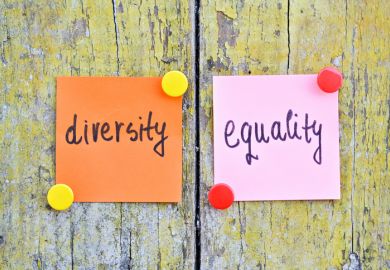When I set up the Black British Academics network as a PhD student back in April 2013, my sole motivation was to create a supportive space for staff and students of colour – a place where we could feel a sense of belonging and worth to counter the isolation and marginalisation that typifies our experience in academia.
Within six months, it became apparent that activism was very much a desire and goal of the members, the majority of whom are women. This led to the formation of the Black Sister Network in 2014, and my creation of The Ivory Tower as a project to promote active engagement towards fulfilling our mission of self-empowerment.
The first phase of this project, the book Inside the Ivory Tower: Narratives of Women of Colour Surviving and Thriving in British Academia, took three years to complete and has been an enlightening, empowering and educational experience for the 10 of us who make up the “sisterhood” of authors and contributors.
I made a conscious decision to use autoethnography as a methodological approach because I felt that it was more in keeping with the political origins of black feminism and would promote deeper engagement among readers than simply imparting statistical data.
I felt that as female academics of colour, we were all dehumanised, and sharing personal narratives was a step towards retrieving our humanity. During the editorial process, as stories unfolded through each chapter, I saw a common thread running through all of them: whiteness.
I found it uncanny, since it was never intended to be the specific focus of the book, but the subtle experiences of racist and sexist abuse, invisibility, hypervisibility, dehumanisation and objectification all pointed clearly towards whiteness; not only as a major theme within the book, but as the common denominator within raced and gendered experiences of inequality within academia.
The development of the Ivory Tower project has run concurrently with my present post at Bournemouth University, an institution with a relatively low proportion of staff and students of colour, which makes it more difficult for white staff and students to see white privilege and the subtle ways that race shapes experiences and outcomes.
However, as deputy chair of the race equality charter committee, and as a lecturer to predominantly white students, I have often found that sharing my own experiences of racial and gendered inequality is an effective way to engender a critical consciousness about whiteness.
It is easy for white colleagues to cite feminist and anti-racism activist Peggy McIntosh’s knapsack of unearned privileges and perceive themselves as experts on whiteness, while acting in ways that marginalise or exclude us as women of colour. But when I relay my own experiences, it makes it personal, because the lesson on whiteness comes from someone they know.
Knowledge of whiteness from lived experience creates a greater sense of urgency and willingness to act to challenge the status quo. Inside the Ivory Tower, therefore, serves a dual purpose: it empowers women of colour, and it functions as a tool to promote critical understandings of whiteness.
I have now moved on to the next phase of the Ivory Tower project, which is to evaluate how readers are engaging with the book, to assess what readers of different ethnic and cultural backgrounds learn from it and to develop specific ways in which it can be used more broadly as a critical tool of analysis on whiteness. Ideas that I’m currently working on include focus groups, workshops and an ethnodrama.
To date, reader reviews and the preliminary findings of a reader survey suggest that this approach can yield positive outcomes for race equality, which is characterised by this response to our reader survey:
“It empowers me in attempting to check my white, male, professorial privilege. This is an ongoing process and one that is never quite finished, so it is important to hear narratives and new forms of understanding that enable me to reflect and then act differently. The book is central to that for me, because I do not believe that the same voices that got us into this mess are those to whom we should be listening to find a way out.”
Deborah Gabriel is a senior lecturer in marketing communications at Bournemouth University and founder of Black British Academics.
POSTSCRIPT:
Print headline: Our stories as women of colour can challenge academia’s status quo
Register to continue
Why register?
- Registration is free and only takes a moment
- Once registered, you can read 3 articles a month
- Sign up for our newsletter
Subscribe
Or subscribe for unlimited access to:
- Unlimited access to news, views, insights & reviews
- Digital editions
- Digital access to THE’s university and college rankings analysis
Already registered or a current subscriber?


